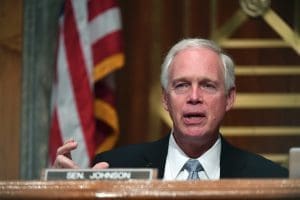Meet an anti-democracy Senate candidate: Ron Johnson
Wisconsin’s Republican senator has consistently fought against voting right protections and pro-democracy policies, in addition to supporting attempts to overturn the 2020 election.

Correction, Oct. 11, 2022: This story has been updated to reflect the fact that End Citizens United is a Democratic nonprofit group.
Over 12 years in the Senate, Sen. Ron Johnson (R-WI) has consistently opposed legislation that protects voting rights or supports American democracy. He has baselessly claimed that voter suppression and election denialism are aligned with the will of voters.
Johnson, considered one of the Senate’s most unpopular members, previously pledged to only serve two terms — even sponsoring a proposed constitutional amendment to set limits for the amount of time — senators to 12 years total, is seeking a third term this November.
Johnson will face current Wisconsin Lt. Gov. Mandela Barnes, the Democratic nominee for his Senate seat, in November. Barnes has released a detailed “plan for democracy” explaining how he plans to make voting rights a priority. “In a democracy established by and for the people, far too many of our leaders think the rules don’t apply to them, and they’ve failed to address the critical priorities of working Americans,” he states
Barnes’ proposals include a new voting rights act, a ban on partisan gerrymandering, and a constitutional amendment to overturn the Supreme Court’s 2010 Citizens United v. Federal Election Commission decision that allowed unlimited “independent” campaign spending. “We must hold our leaders accountable and build a democracy that works for working people,” he states.
Johnson has fought against that policy and others that advocates argue will ensure fair and free elections. The Democratic nonprofit group End Citizens United rated the Wisconsin Senator with an “F” on its May 2022 anti-corruption and voting rights scorecard, observing, “From protecting our elections, to rooting out corruption, to increasing transparency, to strengthening government ethics, Johnson voted against every effort to protect our democracy.”
A Johnson spokesperson did not immediately respond to an inquiry from the American Independent Foundation. But his previous comments and voting record are clear.
Broke campaign promise to support campaign finance transparency
Johnson has spent much of his 2022 campaign complaining about all the “dark money” being spent against him by progressive groups. Yet, he has repeatedly opposed campaign finance transparency policies, which he previously backed as a Senate candidate.
In October 2010, Johnson told the Milwaukee Journal Sentinel’s editorial board that he was for the DISCLOSE Act, a bill to ensure that political groups reveal the names of the donors who bankroll their campaign ads. He claimed, “It’s far better to have those contributions [that are] coming to the campaigns and coming to parties be disclosed… Whatever’s a reasonable period of time. A couple days. And get those transparent postings of full disclosure of who’s donating to what group on the Internet and get that posted. I would like to see total transparency [of third party groups].”
But by July 2012, he had joined 43 other Senate Republicans to filibuster and effectively kill that legislation. In 2022, he opposed the Freedom to Vote: John R. Lewis Act, which End Citizens United described as “a commonsense anti-corruption” law had it gone into effect.
Refused to support election reform but backed voter suppression laws
Over the past two years, Johnson had voted to block even considering three separate bills aimed at voting rights and election reform.
In August 2021, he voted against holding debates on the Senate floor for S. 1 — the For the People Act — which would have strengthened voting rights and implemented campaign finance reforms. Johnson blasted the bill as “another Orwellian-named bill” that was a “powergrab” by Democrats to “cheat” at elections. He also voted against bringing up a similar proposal — the Freedom to Vote Act — two months later.
In November, he additionally voted against advancing S. 4, the John R. Lewis Voting Rights Advancement Act, which would have restored and updated provisions of the Voting Rights Act of 1965.
In a January 2022 radio interview with GOP megadonor John Catsimatidis, Johnson argued that voting rights protections are no longer even needed. “Show me somebody in the recent past that has wanted to vote that couldn’t. We’ve made voting incredibly easy. Nobody’s suppressing the vote,” he claimed.
In the same interview, he also claimed that “There’s nothing racist about voter ID.” That ignores voter ID rules’ origins from segregation, which continues to affect poor or non-white voters disproportionately: about 25% of adult Black citizens lack a government-issued photo ID compared to just 8% of their white counterparts, according to a 2015 Project Vote analysis. Johnson has frequently pushed for strict photo identification laws, calling them “Common sense” policies.
Republicans across the country have tried to use unfounded voter fraud claims as an excuse to enact further voter restrictions laws and other measures designed to suppress turnout by voters.
“Americans are not looking for election reform,” Johnson claimed in the same interview with Catsimatidis, “It’s just something Democrats want to pass … so they can literally turn America into a socialist paradise.”
Supported attempts to overturn 2020 election of Biden
Johnson backed then-President Donald Trump in the 2020 presidential election. Trump lost the vote, both nationwide and amongst Wisconsinites, but Johnson tried to help Trump’s efforts to overturn the election results and avoid certifying Joe Biden’s victory.
As the then-chair of the Senate Homeland Security and Governmental Affairs, Johnson used hearings at the end of 2020 to examine “irregularities in the 2020 election” and openly cast doubt on the integrity of the election. Johnson then signed a letter along with 10 other Senate Republicans in early January 2021 demanding an “Electoral Commission” to audit the 2020 election results and reject lawfully-chosen electors from “disputed states” until otherwise.
When those efforts at forcing a 10-day national audit failed, Johnson again attempted to subvert the results by sending fraudulent slates of unlawful electors — Trump supporters from Michigan and Wisconsin who were not actually elected to represent those states’ voters — prior to the official counting of the Electoral College results.
A staffer for then-Vice President Mike Pence rebuffed Johnson’s attempt and Congress upheld Biden’s victory, texts shown at January 6 Committee hearings revealed. Afterwards, Johnson played down his involvement, telling CNN, “Literally, my involvement lasted seconds.” Despite that, he hired one of the fraudulent electors from Wisconsin to work on his campaign staff.
As recently as August 2021, Johnson still backed proposals of an audit of the already-certified elections results — though he has conceded that there was “nothing obviously skewed about the results.”
Opposed efforts to hold insurrectionists accountable
While Johnson was attempting to overturn Biden’s victory on Jan. 6, 2021, thousands of pro-Trump insurrectionists illegally entered the U.S. Capitol while both chambers of Congress were in session. The attack caused millions of dollars’ worth of property damage forced a delay of the electoral college certification, and contributed to the deaths of multiple law enforcement officers.
Despite that, Johnson voted to acquit Trump for inciting the attacks and voted against establishing the January 6 Committee, the bipartisan House commission that has investigated what happened.
In a May 2021 interview with local television station WFRV, he argued such a probe was not necessary because he was conducting his “own personal investigation” to “completely reconstruct what happened on Jan. 6.”
He has repeatedly defended the insurrectionists. Johnson told the right-wing radio hosts Joe Pags in March 2021 that he was not afraid during the insurrection because the mobs illegally in the building “were people that love this country, that truly respect law enforcement, would never do anything to break the law.”
He falsely claimed on Fox News in May 2021 that “by and large it was peaceful protests.” In June, he told the network that although he didn’t “condone” the attack, he didn’t believe it was “what armed insurrection would look like.”
Disenfranchising 670,000 people in the District of Columbia
According to the Census Bureau’s July 2021 estimate, more than 670,000 Americans reside in the nation’s capital city, Washington, D.C. But while about 80% of these people are of voting age, none of them can cast a vote for a representative in Congress. Lawmakers elected by citizens in the 50 existing states not only set federal laws, but supersede and overrule the powers of elected city government on local D.C. matters.
This is due to a provision in the Constitution that established that the capital would be a congressionally supervised area and not part of any state. But while a few people lived in the area when the District of Columbia was established in the late 1700s, its population is now larger than some states.
To address this problem, Democratic lawmakers introduced the Washington, D.C. Admission Act — a bill that would make the residential areas of D.C. into a new state called Washington, Douglass Commonwealth, while keeping the federal buildings and monuments separate. The bill passed the House in April 2021, but has stalled in the Senate in the face of GOP opposition.
At a June 2021 hearing, Johnson opposed enfranchising D.C. residents and suggesting that they did not need to be citizens because they are wealthy and mostly vote Democratic.
“There’s certainly poverty here, but this District is not made of many disadvantaged individuals,” he inaccurately claimed. “This is an elite group of people here, they have a vested interest in the power of the federal government. To me, this just seems like a naked power grab.”
Published with permission of The American Independent Foundation.
Recommended

New NC GOP chair flirts with bogus stolen election conspiracies
Simmons predecessor was a staunch 2020 election denier
By Jesse Valentine - April 19, 2024
Texas activists pushed abortion restrictions in NM cities and counties, records show
Emails reveal influence and control in exchange for promises of legal help
By Austin Fisher, Source NM - March 04, 2024
Cannabis workers across Missouri begin push to unionize dispensaries
The first day was a breeze. Sean Shannon and Danny Foster walked into several marijuana dispensaries around Missouri with their matching “Union For Cannabis Workers” shirts and talked to employees about the possibility of unionizing. “The first day, there were 57 stops amongst the teams,” said Shannon, lead organizer with UFCW Local 655, which actually […]
By Rebecca Rivas - December 04, 2023









































































